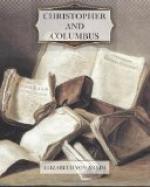But on that first birthday after her death they had got more and more solemn as time passed, and breakfast was cleared away, and there were no sounds, prick up their ears as they might, of subdued preparations in the next room, no stealthy going up and down stairs to fetch the presents, and at last no hope at all of the final glorious flinging open of the door and the vision inside of two cakes all glittering with candles, each on a table covered with flowers and all the things one has most wanted.
Their aunt didn’t know. How should she? England was a great and beloved country, but it didn’t have proper birthdays.
“Every country has one drawback,” Anna-Rose explained to Anna-Felicitas when the morning was finally over, in case she should by any chance be thinking badly of the dear country that had produced their mother as well as Shakespeare, “and not knowing about birthdays is England’s.”
“There’s Uncle Arthur,” said Anna-Felicitas, whose honest mind groped continually after accuracy.
“Yes,” Anna-Rose admitted after a pause. “Yes. There’s Uncle Arthur.”
CHAPTER II
Uncle Arthur was the husband of Aunt Alice. He didn’t like foreigners, and said so. He never had liked them and had always said so. It wasn’t the war at all, it was the foreigners. But as the war went on, and these German nieces of his wife became more and more, as he told her, a blighted nuisance, so did he become more and more pointed, and said he didn’t mind French foreigners, nor Russian foreigners; and a few weeks later, that it wasn’t Italian foreigners either that he minded; and still later, that nor was it foreigners indigenous to the soil of countries called neutral. These things he said aloud at meals in a general way. To his wife when alone he said much more.
Anna-Rose, who was nothing if not intrepid, at first tried to soften his heart by offering to read aloud to him in the evenings when he came home weary from his daily avocations, which were golf. Her own suggestion instantly projected a touching picture on her impressionable imagination of youth, grateful for a roof over its head, in return alleviating the tedium of crabbed age by introducing its uncle, who from his remarks was evidently unacquainted with them, to the best productions of the great masters of English literature.




